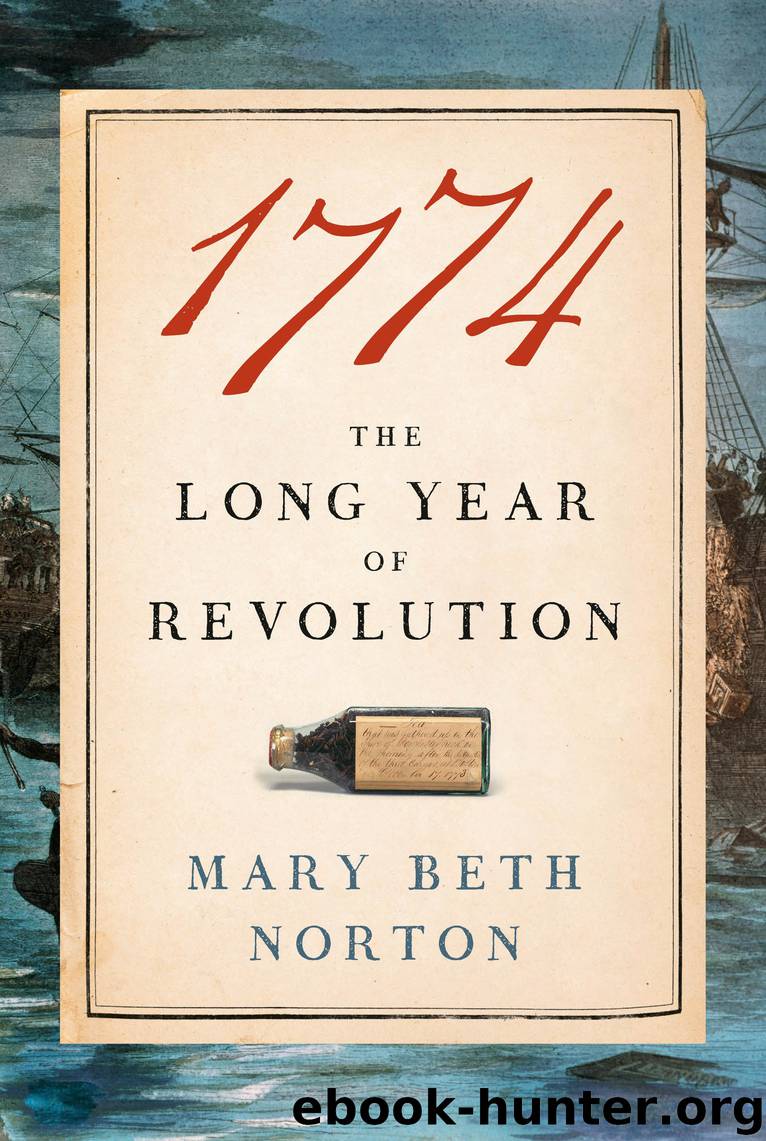1774 by Mary Beth Norton

Author:Mary Beth Norton
Language: eng
Format: epub
Publisher: Knopf Doubleday Publishing Group
Published: 2020-02-10T16:00:00+00:00
CONTROVERSIES IN MARYLAND AND MASSACHUSETTS
Although he did not mention it to Johnson, Duane had already been unnerved by actions of the Maryland Provincial Convention in early December. The convention adopted a series of resolutions, most of them endorsing the resolves of the First Continental Congress. But, controversially, the representatives also called for the organization of a colony-wide militia. All men between the ages of sixteen and fifty would be enrolled, and funding would be “voluntary,” collected at the county level. Duane protested that action vehemently to Samuel Chase, another Maryland delegate. “The Step you have taken which will be called an Assumption of the Militia into your own hands is certainly of a very serious nature and here it produces great Anxiety,” he exclaimed, for it was “the first publick Act out of the pale of New England which indicates a preparation for war.” Maryland’s action would “inflame” the Bostonians, divide the colonies, and give “a vindictive Ministry” a reason to start a war. He advocated acting “with wisdom and Temper, [to] avoid the Imputation of commencing hostilities.” Americans should instead “persevere with Virtue and Fortitude in our Association.”
Duane’s caution had little or no impact on his correspondents; Johnson and Chase remained staunch supporters of the efforts to raise and arm the militia in their colony. But the purportedly “voluntary” plan for funding—an obvious means of circumventing the problematic issue of whether the convention could impose taxes on the populace—aroused vocal opposition throughout Maryland. In both Baltimore and Annapolis, contentious meetings addressed the questions of how to raise the money and how to penalize men who failed to contribute. Controversies developed over schemes to solicit funds privately, to post public subscription lists for signatures, or to publicize the names of those who failed to comply.
Some, like the Baltimore attorney George Chalmers, not only refused to give any money but also tried to persuade friends to do the same. Others, like some of Johnson’s acquaintances, were so angered by “cursed Hand Bills” threatening public shaming for delinquents that they either declined subscribing or refused to pay after they had initially signed up. The Maryland Gazette published a series of rhetorical questions, including “Is it consistent with liberty—the distinguishing characteristick of British subjects—to condemn, with a partial fury, those who dissent from any popular opinion?” And another: “Is it wise, is it politick, to ferment and create divisions among ourselves?” The answers were clearly no but were nonetheless offered explicitly: “Let us not…commit violences greater than those of which we complain.”
Download
This site does not store any files on its server. We only index and link to content provided by other sites. Please contact the content providers to delete copyright contents if any and email us, we'll remove relevant links or contents immediately.
The Art of Coaching Workbook by Elena Aguilar(48303)
Trainspotting by Irvine Welsh(20067)
Twilight of the Idols With the Antichrist and Ecce Homo by Friedrich Nietzsche(17710)
Fangirl by Rainbow Rowell(7840)
Periodization Training for Sports by Tudor Bompa(7339)
Change Your Questions, Change Your Life by Marilee Adams(6653)
This Is How You Lose Her by Junot Diaz(5791)
Grit by Angela Duckworth(4743)
Red Sparrow by Jason Matthews(4676)
Asking the Right Questions: A Guide to Critical Thinking by M. Neil Browne & Stuart M. Keeley(4591)
Paper Towns by Green John(4174)
Room 212 by Kate Stewart(4111)
Ken Follett - World without end by Ken Follett(3980)
The Sports Rules Book by Human Kinetics(3593)
Housekeeping by Marilynne Robinson(3407)
The Motorcycle Diaries by Ernesto Che Guevara(3340)
Introduction to Kinesiology by Shirl J. Hoffman(3305)
Exercise Technique Manual for Resistance Training by National Strength & Conditioning Association(3295)
Double Down (Diary of a Wimpy Kid Book 11) by Jeff Kinney(3283)
